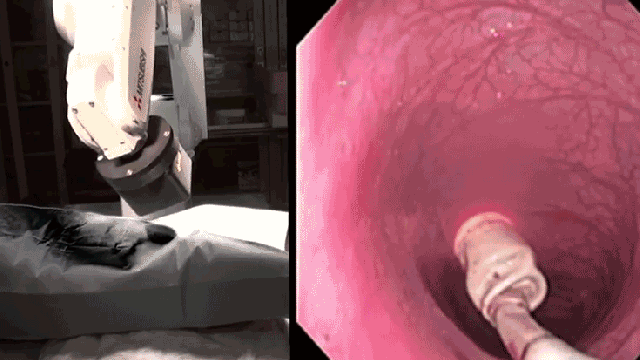As you get older, colonoscopies become an important part of maintaining your health, allowing doctors to spot potentially fatal diseases like colon cancer before they progress too far. So medical researchers are hoping to make the procedure safer, and slightly less invasive, using a tiny capsule that’s remotely steered around using a magnet outside your body.
A colonoscopy typically involves a device called a colonoscope, a 2.5cm-thick cable with a camera and light on the end, that enters a patient through the rectum in order to access and examine their large intestine. The patient is usually sedated during the mostly pain-free procedure, but as the colonoscope is pushed through the digestive tract, the physical pressure on the colon can result in pain or soreness during recovery.
In an attempt to streamline the procedure, and make it less invasive, medical researchers from Vanderbilt University and the University of Leeds have co-developed a first-of-its-kind capsule robot, 18mm in diameter, that can be pulled and manoeuvred through a patient’s large intestine using a robotic arm that manipulates a powerful magnet on the outside. If you’ve every dragged a coin around a table by holding a magnet underneath it, you understand the basic idea here, which was presented Monday at the Digestive Disease Week conference in Chicago.
The capsule’s tether, which facilitates power and the camera’s live video feed, is significantly thinner than a traditional endoscope, making it less invasive. But the scope remains just as manoeuvrable, letting doctors still perform a thorough examination.
However, the biggest improvement here is that the capsule is pulled through the large intestine by the robot arm’s magnet, instead of being pushed by a doctor. This reduces the pressure and physical exertion on the colon walls, minimising pain or discomfort afterwards. There’s the possibility that patients won’t have to be put under during the procedure, which would mean less recovery time.
So far, the capsule has only been tested and remotely steered through a pig’s large intestine, but the researchers are hoping to start human trials closer to the end of 2018. That means it will still be quite a few years before this technology is finally made available to proctologists. In the meantime, if you’re due for a colonoscopy, you should just grin and bear it, as the alternative of ignoring your intestines could be much, much worse.
